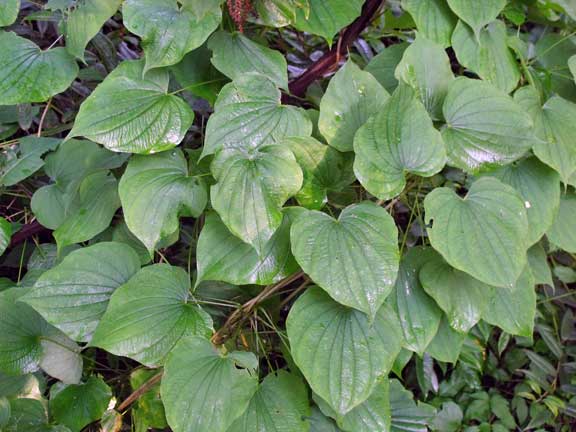There are all kinds of predictable plants in Western North Carolin. The common plants here are both native and invasive to our Eastern forests: dandelion, yellow dock, violet, and sassafras, to name a few.
Sometimes, however, there are the rarer woodland medicinal plants that are a joy to see. Bloodroot, which can be spotted here and there in moist out-of-the-way spots, blooms in early spring with such a delicate beauty that it makes an annual pilgrimage more than worthwhile. Black Cohosh, sometimes flanking pathways on nearby hikes and sometimes found deep in the woods, sports long tendriled summer blooms. Seeing them always produces a feeling akin to reverence in me especially knowing their endangered status and powerful medicinal qualities.
But it is with special anticipation and excitement that I watch for the wild yams. I’ve gotten so fond of them, in fact, that I’ve learned to spot them out of the corner of my eye even while hiking at a good clip and in deep conversation. Dioscorea villosa is the Latin name of the wild yam, which is indigenous to the Americas. It’s got heart shaped leaves and a large underground tuber, which has been and still is used as a food crop throughout much of the world (please note that there are poisonous varieties).
Medicinally, wild yam has a long and highly acclaimed history. The Mexican wild yam, a relative of our North Carolina variety, is the plant that led to the development of the birth control pill. Native peoples everywhere has long used it to treat “female problems” of all kinds, including the pains of childbirth, cramping, and menopause symptoms. Still used in this fashion, we know through science that wild yam contains hormonal “precursors” that help the body respond to and manufacturer much needed natural chemicals. In fact, it’s become part of the “natural” hormone replacement therapy for thousands of menopausal women. Additionally, wild yam is now used to treat many conditions, such as hypertension, rashes, joint inflammation, osteoporosis and arthritis.
As a conscious herb lover, I don’t harvest the yam because it is so rare in our area. I prefer to buy it from farmers growing it sustainably. But I do befriend it, admire it, and enjoy the beauty.
Lee Warren is a homesteader, herbalist, writer and the manager of Imani Farm, a pasture-based cooperative farm at Earthaven Ecovillage. She is also a co-founder of the Village Terraces CoHousing Neighborhood and the Program Coordinator for the Southeast Women’s Herbal Conference (sewisewomen.com).
http://www.mountainx.com/images/blogimages/035-Wild-yam,-fall-colors.jpg
http://www.mountainx.com/images/blogimages/DSCF0887.jpg



Before you comment
The comments section is here to provide a platform for civil dialogue on the issues we face together as a local community. Xpress is committed to offering this platform for all voices, but when the tone of the discussion gets nasty or strays off topic, we believe many people choose not to participate. Xpress editors are determined to moderate comments to ensure a constructive interchange is maintained. All comments judged not to be in keeping with the spirit of civil discourse will be removed and repeat violators will be banned. See here for our terms of service. Thank you for being part of this effort to promote respectful discussion.